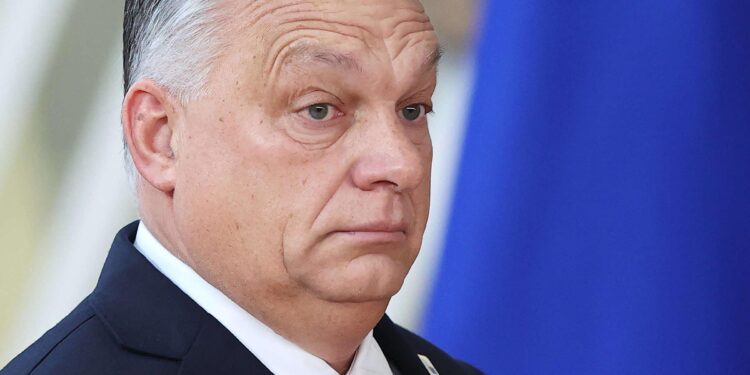Hungarian Prime Minister Viktor Orb√°n has launched a series of sharp criticisms against Ukraine, a move widely seen as an attempt to strengthen his standing among domestic audiences. In recent statements, Orb√°n accused Kyiv of exacerbating regional tensions, positioning himself as a defender of Hungarian national interests amid the ongoing conflict in Eastern Europe. This development comes as Orb√°n faces mounting political challenges at home, highlighting how the Ukraine crisis continues to influence domestic politics within neighboring countries.
Hungary’s Orban Criticizes Ukraine Amid Rising Domestic Nationalism
Prime Minister Viktor Orban has intensified his criticism of Ukraine amid a wave of rising nationalist sentiment within Hungary. Framing his remarks around protecting Hungarian minorities and opposing Kyiv’s policies, Orban has shifted his rhetoric to appeal to his domestic base ahead of upcoming elections. His statements highlight perceived risks to ethnic Hungarians in Transcarpathia and cast doubt on Ukraine’s commitment to minority rights, stirring controversy on both sides of the border.
Key points fueling this nationalist narrative include:
- Allegations of discrimination against Hungarian-language schools in Ukraine
- Concerns over border security and migration policies
- Calls for stronger diplomatic leverage to safeguard Hungarian communities abroad
| Issue | Orban’s Stance | Ukraine’s Response |
|---|---|---|
| Minority Language Education | Demand for protection and reinstatement | Emphasizes national unity and legal reforms |
| Ethnic Rights | Claims rights violations | Denies systemic discrimination |
| Border Security | Advocates stricter controls | Focuses on cooperation against illegal migration |
Analyzing the Political Strategy Behind Orban’s Stance on Ukraine
Viktor Orban’s increasingly critical rhetoric towards Ukraine appears to serve a calculated domestic political agenda. Amid economic challenges and public frustration over energy prices and inflation, Orban leverages a tough stance on Kyiv to strengthen his image as a leader who prioritizes Hungarian interests over foreign entanglements. By casting Ukraine as an unreliable or divisive actor, Orban taps into nationalist sentiment while diverting attention from internal issues. This approach also aims to appease segments of the electorate skeptical about Hungary’s role in the broader EU response to the conflict, positioning Orban as a strongman defender of sovereignty.
Several key elements underpin this strategy:
- Energy Security Concerns: Emphasizing Hungary’s dependence on Russian gas supplies, Orban contrasts his pragmatic diplomacy with Brussels’ hardline stance.
- Electoral Calculations: Consolidating support among conservative and rural voters who prioritize stability over foreign policy risks.
- EU Relations: Navigating a delicate balance between cooperation and resistance, maintaining leverage within EU institutions.
| Political Factor | Orban’s Approach | Domestic Impact |
|---|---|---|
| Energy Policy | Favors Russian supplies, criticizes sanctions | Appeases industries, calms public fears |
| Nationalism | Promotes sovereignty over EU alignment | Strengthens right-wing base |
| Media Control | Amplifies anti-Ukraine narratives | Shapes public opinion favorably |
Experts Recommend Balancing Foreign Policy to Maintain Regional Stability
Regional analysts emphasize the critical need for a nuanced approach in foreign affairs, especially given the escalating tensions surrounding Eastern Europe. Balancing diplomatic engagement with strategic caution is seen as essential to prevent further destabilization. Experts argue that unilateral rhetoric or aggressive posturing by leaders risks exacerbating existing conflicts, potentially drawing multiple actors into prolonged disputes. Maintaining open communication channels, while addressing national interests carefully, remains a core pillar in preserving peace.
Key elements suggested by foreign policy specialists include:
- Promoting dialogue efforts between conflicting parties
- Strengthening multilateral institutions and alliances
- Ensuring economic ties that incentivize cooperation
- Respecting sovereignty while addressing security concerns
| Policy Focus | Potential Impact |
|---|---|
| Diplomatic Mediation | Reduces misunderstandings and curtails escalation |
| Economic Cooperation | Builds mutual dependency that favors stability |
| Security Guarantees | Assures smaller states, preventing regional arms races |
| Transparent Communication | Builds trust and deters misinformation campaigns |
The Conclusion
As Hungary’s Prime Minister Viktor Orb√°n continues to adopt a hardline stance against Ukraine, analysts suggest that this approach is aimed at consolidating his domestic political base amid growing challenges. While his rhetoric resonates with segments of the Hungarian electorate skeptical of deeper involvement in the conflict, it further complicates Budapest’s relations with both Kyiv and its Western allies. The unfolding dynamics will remain a key indicator of Hungary’s position within the broader regional and international landscape.















